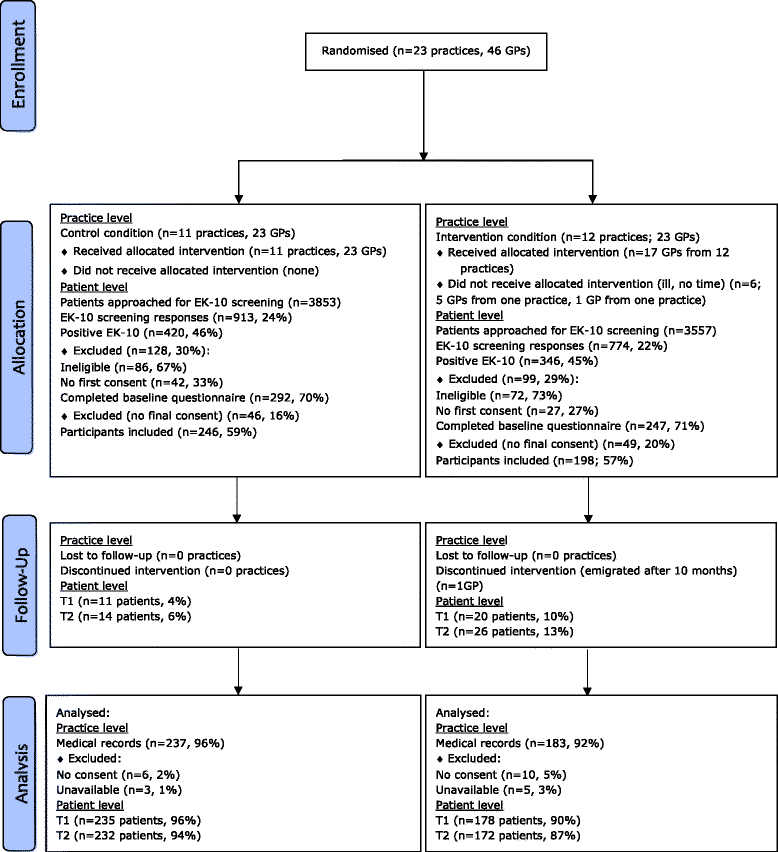Effectiveness of a tailored implementation programme to improve recognition, diagnosis and treatment of anxiety and depression in general practice: a cluster randomised controlled trial
- PMID: 25884819
- PMCID: PMC4360947
- DOI: 10.1186/s13012-015-0210-8
Effectiveness of a tailored implementation programme to improve recognition, diagnosis and treatment of anxiety and depression in general practice: a cluster randomised controlled trial
Abstract
Background: Anxiety and depression are not always diagnosed and treated in primary care as has been recommended. A tailored implementation programme, which addresses key barriers for change by targeted interventions, may help to remedy this.
Methods: The effectiveness of an individually tailored implementation programme, additional to standardised training and feedback on the recognition and treatment of patients with anxiety or depression in general practice, was examined in a cluster randomised controlled trial. Participants were 46 general practitioners (GPs) from 23 general practices (12 intervention, 11 control) and 444 patients aged 18 years or older (198 intervention, 246 control) who screened positive on the extended Kessler 10. In the control group, GPs received a 1-day training in guidelines for recognition and stepped treatment for anxiety and depression. Ten months after the training session, GPs received feedback on their performance over the preceding 6 months. In the intervention group, GPs received the same training and feedback as those in the control condition; in addition, they were offered support, tailored to perceived local barriers to change. The support was delivered in the format of peer group supervisions and personalised telephone consultations. Data were based on an audit of patient records and patient surveys at baseline and after 3 and 6 months.
Results: The tailored implementation programme led to recognition of a higher proportion of patients presenting with anxiety and depression (42% versus 31%; odds ratio (OR) = 1.60; 95% CI: 1.01-2.53), more consultations after recognition (IRR = 1.78; 95% CI: 1.14-2.78) and did not lead to more prescription of antidepressants (OR = 1.07; 95% CI: 0.52-2.19) or referral to specialist mental health services (OR = 1.62; 95% CI: 0.72-3.64). Patients in the intervention group reported better accessibility of care (effect size (ES) = 0.4; p < 0.05) and provision of information and advice (ES = 0.5; p < 0.05).
Conclusions: A tailored implementation programme may enhance the recognition and treatment of patients with anxiety or depression. Further development and evaluation of the programme is warranted to determine its cost-effectiveness.
Trail registration: Dutch Trial Register identifier NTR1912 .
Figures
References
-
- Alonso J, Angermeyer MC, Bernert S, Bruffaerts R, Brugha TS, Bryson H, de GG, Graaf R, Demyttenaere K, Gasquet I, et al. Disability and quality of life impact of mental disorders in Europe: results from the European Study of the Epidemiology of Mental Disorders (ESEMeD) project. Acta Psychiatr Scand Suppl. 2004;420:38–46. - PubMed
-
- van Avendonk M, van Weel-Baumgarten E, van der Weele G, Wiersma T, Burgers JS. Summary of the Dutch College of General Practitioners’ practice guideline ‘Depression’. Ned Tijdschr Geneeskd. 2012;156:A5101. - PubMed
Publication types
MeSH terms
Substances
Associated data
LinkOut - more resources
Full Text Sources
Other Literature Sources
Medical


